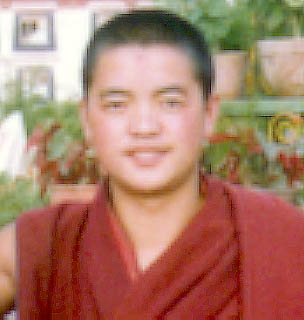
Ngawang Lhundrup, a recent arrival from Tibet, was a monk from Shedrupling Monastery in Lhoka Gonkar at the age of 14. He took part in a demonstration in Barkhor, Lhasa, in 1992, as a result of which he spent 2 years in Gutsa Prison. He recounted the story of a political prisoner’s life in a Chinese prison in Tibet.
Ngawang Lhundrup, from Ghonkar County in Lhoka region, was born in 1975. He joined Shedrupling Monastery in Lhogongkar at the age of 14. Sometime later, the head of the Gongkar county and Gangtoe township came to the monastery and ordered all except 25 monks to leave the monastery. Those who had ever been imprisoned or visited India were particularly targeted. After 1992 Chinese officials started to conduct patriotic re-education in the monastery and it was then that Ngawang became determined, in his words, “not to sit by and just watch”.
“On 12 August 1992, I was involved in a demonstration in Barkhor in Lhasa along with some other monks and nuns. Together with a monk from Khangmar monastery, I held a big picture of the Dalai Lama with the Tibetan national flag and another monk named Ngawang Dorjee distributed leaflets reading: ‘Free Tibet’, ‘Long Live His Holiness the Dalai Lama’, ‘Chinese quit Tibet’, and ‘We demand human rights in Tibet’.
“A little away from Barkhor, two policemen snatched the flag from my hand and beat me as they threw me into a van. A short while later Ngawnag Dorjee and three nuns – Yeshi Dolma, Ngawang Yangchen and Ngawang Choezom – were also put into the van. The others escaped into the crowd.
“The five of us in the van were taken to the Public Security Bureau (PSB) office in Lhasa. They dragged us down from the van and began to kick us and beat us as we were taken to the interrogation room. There we encountered more than 20 officers who covered us with the flag they had earlier snatched and again we were beaten and kicked on every part of the body while they abused the Dalai Lama. When they grew tired they gave us each a rod and ordered us to beat each other. When we refused they hit us even harder on the shins, head and abdomen.
“We were taken to Gutsa Detention Centre after six hours of severe beating and interrogated about the names of those who had escaped. When we refused to answer there were more beatings. At around 7 p.m. we were placed in separate cells after all of our belongings were taken away. The majority of prisoners in my cell were Tibetan political prisoners, together with some prisoners detained for murder and theft.
“Political prisoners in Tibet are always regarded as worse than the criminals; they receive much higher prison terms and their families are not even informed of their arrest. I suffered greatly from malnutrition and the absence of visitors. At the end of each week I was interrogated and severely beaten, but it was not until 25 September 1992 that my arrest warrant was actually issued .
“Once a month we would be called for a meeting where the prison officials recited the rules of the prison. We would have to sit on the cold floor and listen to this for hours while prison officers raided our cells and stole our stationery, prayer beads and reading materials.
“Chinese prison guards appointed me as a monitor and I had to get up early each morning, clean the whole surroundings of the cell and prepare the morning tea. Prison guards forced me to beg for a handful of tea from each of the prisoners and if I failed I was abused and had to wash the guards’ clothing.
“The prison authorities took a contract to build a dam near Toelung Trisam and the prisoners were sent for forced labour. We got up early each morning to be squeezed into a small van and transported to the construction site. When we were permitted to stop in the evening our hands would be full of blisters and we would be weak with exhaustion.
“On 9 August 1993, the five of us received our notice of trial and on 14 August we were taken to Lhasa People’s court. We received no formal hearing and our verdict was simply issued on 16 August 1993. Ngawang Dorjee, Yeshi Dolma and Ngawang Yangchen were each sentenced to three years and Ngawang Choezom and myself to two years. Each of us was also sentenced to an additional year of deprivation of political rights.
“Towards the end of 1993, one political prisoner complained about the prison conditions, in particular that the sick were still subjected to forced blood extractions under the pretext of receiving physical check ups. As a result, all political prisoners were deprived of visits for three months.
“On 12 August 1994 I completed my prison term. When I went to my monastery I found that a new rule had been introduced by the Chinese officials debarring all those who had ever gone to India or been imprisoned from rejoining the monastery. If any such monk was allowed to rejoin, they threatened to close down the monastery.
“I encountered so many new restrictions on religious practices especially with regard to the long life prayer offered for the Panchen Lama. I distributed about 20 copies of the prayer before fleeing Tibet to practise my religion freely and seek blessing from His Holiness the Dalai Lama.”
